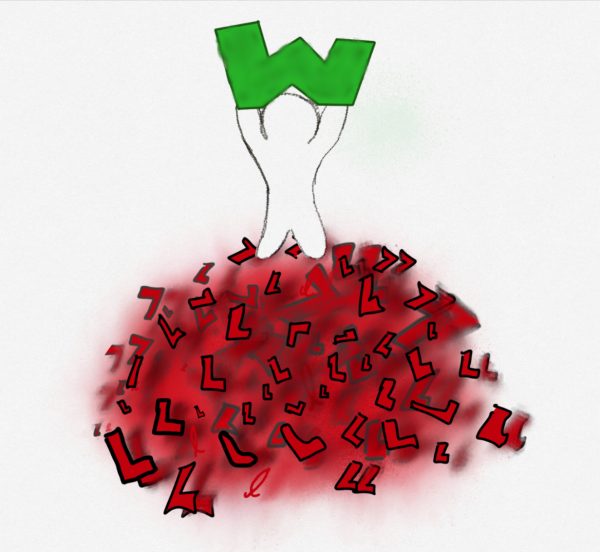Help me, I’m stressed!
How do I relieve stress?
September 13, 2017
We hear about stress every single day of our lives. Your friends are stressed, your family is stressed, you are stressed. But really, what is stress? According to the Oxford Dictionary, stress is “a state of mental or emotional tension resulting from demanding circumstances”. This simple concept has such a significant impact on our lives. So, we know what it is, but we still have a standing question: how do we relieve stress?
Number one: exercise. (Cue the exasperated groan.) Yes, yes, I know, exercise is almost forced onto us teenagers and is spoken about so much that we can almost tune it out. However, most people don’t realize that it actually works. Exercise gets you moving and releases “feel-good” neurotransmitters called endorphins. Endorphins are the natural enemy of depression and anxiety and can actually help you sleep better. In addition to releasing endorphins, exercise is, as phrased by the Mayo Clinic, “meditation in motion”. By exercising, you are shifting your focus from the tensions of the day to the rhythms and patterns of your workout. By the time you’ve finished, you’ll most likely find that you’ve forgotten about the troubles from your day and are feeling much, much better. Exercising will give you a sense of confidence and accomplishment that’ll make your chest swell with good emotions. So maybe try to set up a routine exercising program and see if it works for you.*
If normal exercise doesn’t work for you, try yoga. Yoga is a combination of both physical activity and mental calming. It gets you moving while allowing you to have some time for mental reflection. Poses will increase your strength and flexibility, and concentrating on your breathing will help you find some inner peace. I know it sounds horribly cringey, but it works.**
Two: cut down on the caffeine. Caffeine is a stimulant drug that speeds up the messages going through the brain. People drink coffee and energy drinks containing caffeine every morning to wake up, but they don’t realize how much it can raise your stress levels. Caffeine stays in your body anytime from four to six hours, and for those four to six hours, your brain is on full speed to keep your body awake. This permits no time for your mind to quiet itself and process what’s going on around you, which causes tension and through tension stress. In addition to the initial effects of drinking coffee and energy drinks, drinking caffeinated beverages every day will create a tolerance that minimizes the effect of a single drink. If you can’t feel the familiar effects of the caffeine, you automatically want more so you can get that feeling. I have a friend who has such a high tolerance of caffeine that he can drink two cups of coffee and four Monster™ Energy Drinks before he starts to feel that buzz that most people get after one Starbucks. So cut back on your Starbucks and let your brain take time to just chill and calm down.
Three: unplug for a bit. I’ll be honest, our phones are a huge cause of our stress and anxiety. We’re always so focused on them. They’re constantly going off with group chats and text messages and notifications that, frankly, are overwhelming. I’ve found that when I just turn off my phone or activate my Do Not Disturb mode, I become much calmer. I’m not constantly checking it, thinking, “Did they text me? Do I need to be on my phone right now? What’s going on?” Also, we tend to have our most tense conversations over our phones with texting, and we don’t even realize it’s increasing our stress levels and draining our energy. Take time to set your phone aside for a half-hour each day. Let your brain rest and calm down before you dive back in, and you’ll find that you’ll have a lot of weight off your chest.
Four: find a hobby you can do every day. One consistent factor in your life can make everything feel much more controlled. It gives you something to look forward to. For example, I knit to relieve stress. I’m engaging in a consistent, relaxing movement while getting things done. Some of my friends draw, others write, and others will just listen to calming music. They find something entirely their own and run with it.
Five: light a candle and watch the flame. As the fire dances on the wick, your mind will begin to concentrate on it and forget about your problems. It allows you to enter a serene mindset. Not only that, but if you burn a scented candle, the smell will diffuse in the air, and depending on what scent you have, you will be calmed within minutes. Aromatherapy works wonders. My personal favorites are lavender, which calms you and helps you to have a night of better sleep, along with orange and rose, both of which are good for calming. If you choose this one, just make sure to use the candle responsibly; fire is not a toy, and it can be dangerous if used carelessly. Don’t leave an open flame alone, and always make sure to keep it away from flammable items.
Six: talk about it. There will come a time where the stress is just so overwhelming that you feel like everything is caving in around you. Find a trusted adult to talk it out. Just spill everything to them. And please, don’t feel like you’re inconveniencing them. Really, most teachers at this school are more than willing to give up five to ten minutes of their time to let you rant about problems and life. They might even be able to offer advice if the situation calls for it. Not only they can help you; we have three lovely counselors in the front office every single day all throughout school who are there for you to talk to them. Mr. Linsenmeyer, the mental health counselor, is here every Monday, Wednesday, and Friday just for you to go in and talk to him about your problems. Believe it or not, he’s actually a pretty cool guy. Don’t be afraid to ask for help if you need it.
Seven: breathe. We are always so busy in our lives that we often forget to do something that should come to us naturally. Taking a moment to just concentrate on breathing is a quick and easy way to relieve stress in the moment. Breathe in for a count of four, hold it for three, and let it out for five. Repeat as necessary until you feel more at ease.
There are all these good ways to relieve stress, but there are also some methods that are harmful. Key examples include cutting or self-harm and smoking.
Cutting is — in my understanding — a way to relieve emotional stress and pain by causing physical pain, but it does more harm than help. It only relieves your emotional pain for a few moments but then leaves you with that same empty feeling you started out with. And once the horrible emotional pain creeps back in, you find yourself going back for more. It’s like a drug: addictive and harmful. By dragging that blade against your skin, you are creating a web of ugly scars that will stay on your body forever.
Common physical side effects of cutting and self-harm are***
- wounds or scars
- nerve damage
- broken bones
- hair loss or bald spots
- injury caused by overdose or poisoning
While common psychological effects are***
- irritability
- a desire to be alone in order to self-harm or to hide the evidence of self-harm. This often leads to feelings of loneliness.
- shame and guilt
- the stress and difficulty of having to lie to those around you about the self-injury
- using self-injury to deal with any emotional stress instead of building positive coping techniques
- an overwhelming desire to self-injure to the point where it feels like you can no longer control the behavior
- low self-esteem and self-hatred
- depression
Cutting becomes a positive feedback loop or a cycle in which it continues to build on itself; you are trapped in, and it’s extremely hard to get out of.
Smoking is another big bad guy. Short term effects of smoking include dizziness, headaches, and nausea, while long term effects can include asthma, cancer, chronic bronchitis, tooth decay, yellow teeth and fingernails, and heart disease. The consequences of smoking far outweigh the small benefit you get during the act of smoking. And like most drugs, smoking is something you can become addicted to.****
But just because you’re caught in the horrible cycle of these bad stress relievers doesn’t mean that you can’t escape them. It is possible. My mother can even vouch for this one. She had been using smoking as a way to relieve stress since high school. Soon she became an addict. She smoked for the majority of my childhood and didn’t quit until three years ago. She’s said many times that it was hard to do, and she sometimes longs for a cigarette, but she’s since found a new way to relieve stress. Every day, she will spend a half-hour in our basement walking on the treadmill and watching her shows, and she’s much happier because of it. She found an alternative way to relieve her stress, and you can too.
Everyone will relieve stress in their own ways. You may find out that aromatherapy will work better for you than a hobby, or going on a daily walk will help more than writing it all down, but you will find something. Like all things in life, it’ll take time to experiment with different methods and find what works best for you, but please remember that it’s not impossible. Stress can and will go away, and you will be okay. I promise.
Have a question? Need some advice? Submit your questions to [email protected]!
Sources:
**http://www.mayoclinic.org/healthy-lifestyle/stress-management/in-depth/yoga/art-20044733
***https://www.healthyplace.com/abuse/self-injury/effects-of-self-harm-self-injury/
****http://www.mydr.com.au/addictions/smoking-what-are-the-effects












